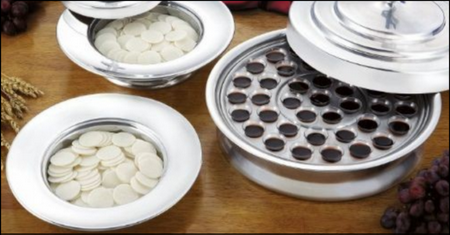The importance of the Lord’s Supper is beyond dispute. In the first century, the disciples partook of the emblems each first day of the week for the purpose of remembering the sacrificial death of Jesus on the cross. It is an example that we emulate in our worship as well. It is a solemn and special feast, and we each should rejoice in the opportunity we have in our assembly to observe it.
We might ask, knowing the significance of the supper, why anyone would sully the experience by improper attitudes or actions? And yet, the Corinthians were guilty of that very thing. They took the Lord’s Supper, but they did it in such a way as to bring Paul’s condemnation of their observance. His admonition is found in 1 Corinthians 11, from verse 17 to 33. “Now in giving these instructions I do not praise you, since you come together not for the better but for the worse” (vs. 17). We should consider their negative example, to learn from and avoid their failures.
They were divided in their observance. “For first of all, when you come together as a church, I hear that there are divisions among you, and in part I believe it” (vs. 18). Nothing should unify God’s people more than remembering the death of their Savior. His shed blood is the means of our redemption, and it is the preeminent principle of our faith. But, when the Corinthians came together there was division and hard feelings in the congregation, which led to inconsiderate actions. “For in eating, one takes his own supper ahead of others…” (vs. 21).
They had turned the supper into a common meal. Imagine your Savior instituting a memorial to His death, and then you turn it into a potluck! This is what the Corinthians did! Perhaps this view of the supper was why some felt no compunction in eating without waiting for others. I find interesting the wordplay of the apostle here, as he states that the Corinthians had not come together to eat “the Lord’s Supper” – rather, each one was taking his “own supper.” This shows that when we change worship, we selfishly make it our own instead of acknowledging it belongs to the Lord. This is never acceptable.
Paul told them that their houses were for their own suppers. When they come together as a congregation, it was for the Lord, not themselves. To change the purpose of coming together from worship to a common meal was despising the “church of God.” “Shall I praise you in this?”, Paul asked, “I do not praise you” (vs. 22).
In verses 23-25, Paul reminded the Corinthians of Jesus’ intent when establishing His supper, quoting Jesus’ words. “Take, eat; this is My body which is broken for you; do this in remembrance of Me” (vs. 24). “This cup is the new covenant in My blood. This do, as often as you drink it, in remembrance of Me” (vs. 25). Paul added, “For as often as you eat this bread and drink this cup, you proclaim the Lord’s death till He comes” (vs. 26).
Paul’s attitude toward the observance of the Lord’s Supper is a wonderful object lesson for us regarding worship in general. Our worship to God belongs to Him, and we must always do it in accord with His instructions. We are not free to innovate or change. The Corinthians had changed the observance of the supper, and displeased God. “For he who eats and drinks in an unworthy manner eats and drinks judgment to himself, not discerning the Lord’s body” (vs. 29).
Let us acknowledge our responsibility to observe the Lord’s Supper, and any other act of worship, exactly as God has instructed and desires. To do otherwise is to sin.
To see The Patternists Page onFacebook , click here , and Like!





